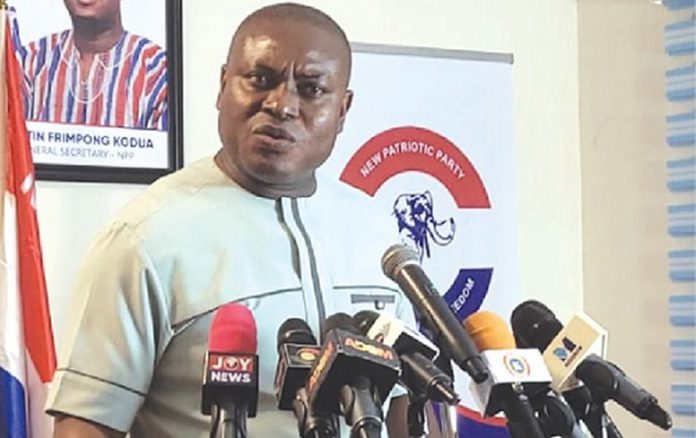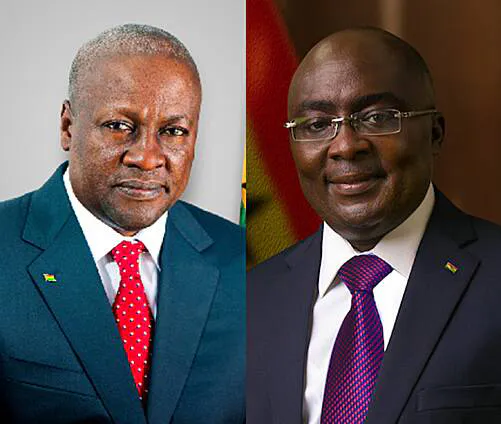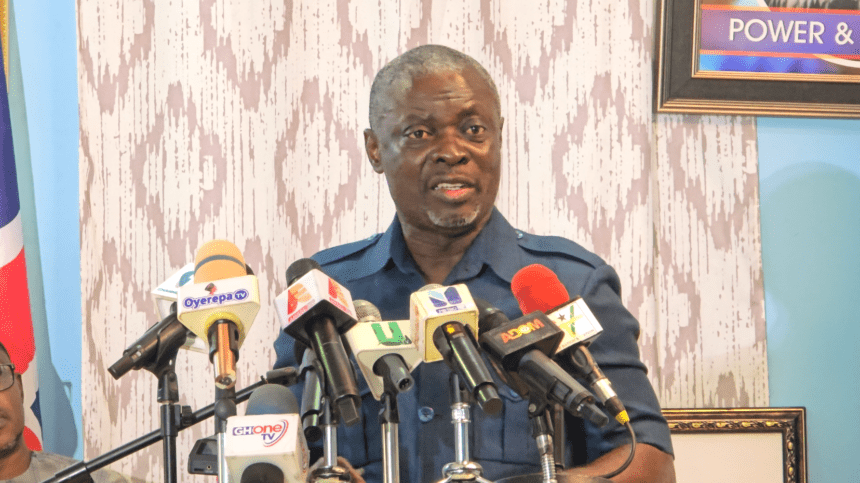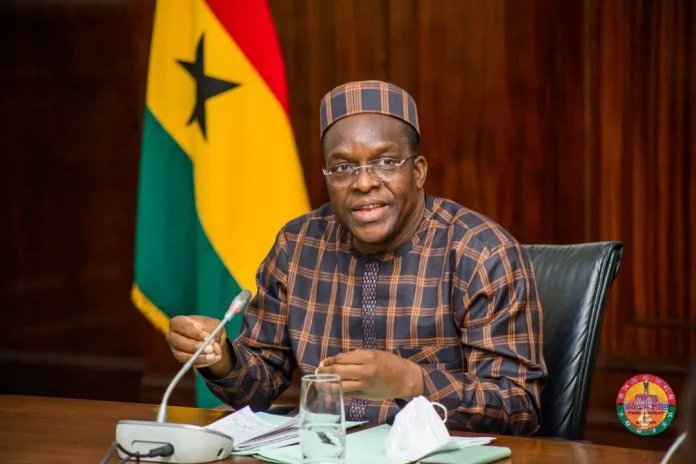Politics
NPP addresses NDC’s claims on cocoa price
Published
1 year agoon
By
Melody 911FM
PRESS CONFERENCE ON COCOA INCREASE AT THE NEW PATRIOTIC PARTY HEADQUARTERS, ASYLUM DOWN, ACCRA
WEDNESDAY, SEPTEMBER 13, 2023
Good evening, and welcome to the Headquarters of the New Patriotic Party. Thank you for coming in your numbers at such short notice.
We have called you this evening to respond to the rather poor attempt by the NDC, led by its flagbearer, to dampen the manifest joy of the cocoa farmers in the historic increase in the producer price of cocoa.
The statement will address the pathetic misinformation campaign of the NDC about the producer price increase and related matters to do with the cocoa sub-sector, among others.
Producer Price Increase
The Producer Price has gone up by 63.5% from GH¢12,800 per metric tonne (GH¢800.00 per bag) to GH¢20,943 or $1,821 per metric tonne, equivalent to GH¢1,308 per bag.
Ghana’s new producer price of cocoa is the highest in 50 years among the West African sub-regional cocoa-producing countries.
The calculations were based on the achieved Free-On-Board (FoB) Price of $2,600 per tonne from the forward sales of cocoa, with an exchange rate of GH₵11.50 to a dollar.
The Benefits:
Increased Income: Cocoa farmers will receive a higher price for their cocoa beans, increasing their income. Farmers can use the extra income to improve their living standards, invest in their farms, and meet other financial needs. It reduces their vulnerability to economic shocks, leading to a more stable and secure livelihood.
Motivation for Cocoa Farming: A higher producer price motivates existing cocoa farmers to continue cocoa cultivation and encourage others to enter the industry, which can contribute to the sustainability of the cocoa sector.
Jobs: The rise in the Producer Price of cocoa is poised to create employment prospects for young individuals in agriculture, engaging them as laborers in tasks like planting, harvesting, and cocoa farm maintenance. With the potential for more significant income, youths will be motivated to pursue cocoa farming as a viable and legal alternative to other, often illicit, endeavors like Galamsey.
Economic Growth: The increased producer price will stimulate economic growth in cocoa-producing areas as farmers and their families spend their additional income on goods and services in their local communities.
Stimulate increase in National Output: With the incentive of a higher price, cocoa farmers may strive to increase their cocoa production, leading to a rise in Ghana’s cocoa production, which can benefit the country’s cocoa industry and exports.
Positive Image for Ghana: Being able to offer the highest producer price in 50 years enhances Ghana’s reputation in the global cocoa industry and leads to more favorable trade relationships and partnerships.
Change in Producer Price Calculation and Announcement
The Producer Price determination mechanism has changed from Net FoB to Gross FoB.
The difference is that with the use of Net FoB, the amount that farmers were to be paid was arrived at after all industry costs had been deducted; however, with the change in the mechanism to use Gross FoB, the amount that farmers would be paid would be determined first before all other industry costs.
The critical difference is that with Net FoB, the amount paid to farmers was arrived at after deducting all industry costs. However, with the change to Gross FoB, the amount that farmers would be paid is determined first before all other industry costs.
Also, there is a reduction in industry cost, which is capped at a maximum of 40% of Gross FoB (not Net FoB).
This year, the announcement of the Producer Price was moved up to September from its typical October schedule. This change was made to give farmers timely access to funds to fulfil their financial responsibilities promptly.
The Benefits:
Higher Payments: This change in the mechanism ensures that farmers receive a more significant portion of the export value of cocoa. In simpler terms, the farmers at the heart of production get a more substantial share of the profits from cocoa exports. The evidence lies in the 63.5% increase for the 2023/24 crop year.
Fairer Distribution of Profits: By giving farmers a more significant share of the profits from cocoa exports, this change in mechanism promotes a more equitable distribution of wealth within the cocoa supply chain. This can lead to improved living standards for cocoa farmers and encourage more people to engage in cocoa farming.
Protection Against Price Drops: This new mechanism helps protect farmers from potential future price drops in the international market. It acts as a safeguard to ensure that farmers are less affected by any declines in cocoa prices that may occur.
Producer Price and Achieved FoB
- Under NDC, when the achieved FoB of cocoa was US$2950, they paid farmers US$1800 per tonne. However, under NPP, with the achieved FoB of cocoa at US$2600, farmers will be paid US$1821 per tonne.
- Ghana engages in forward sales of significant volumes of its cocoa to secure the syndicated loan to pay farmers. As a result, the determination of the Producer Price takes into account the achieved Free-On-Board (FoB) Price over several months of sales. Since prices in the forward sales market differ significantly from spot sale prices, the most recently achieved FoB of $2,600 per tonne formed the basis for calculating the new Producer Prices. It is, therefore, incorrect to compute what one thinks should have been the Producer Price using the current spot price on the international market.
- When NDC left power, the world market price was $2950. The price then sharply declined to an average of $2050 in 2017, rising only marginally to about $2350 two years later. Yet the government maintained the same producer price over the period, resisting international pressure to reduce the price in response to the fall in the world market price of cocoa, and instead chose to subsidize the producer price for farmers. All other producing countries reduced their farmgate price at the time except Ghana.
The government, therefore, spent a fortune to absorb the losses instead of passing them on to worsen the plight of farmers.
RESPONSE TO NDC STATEMENT ON NEW PRODUCER PRICE
Claims by the opposition National Democratic Congress (NDC) that the Government has shortchanged cocoa farmers is false and cannot be supported by actual events on the grounds. As we all know by now, the President’s announcement of the new producer price last Saturday has been greeted with widespread gratification by the entire cocoa community in Ghana.
- Indeed, all stakeholders in the cocoa industry, including Farmers and The Ghana Civil-Society Cocoa Platform (GCCP), have all expressed joy and satisfaction at the new price and have commended the government for staying true to its words. Therefore, anyone claiming that the Government has shortchanged cocoa farmers will be doing so only for political expediency but not based on facts.
Impact of CSSVD on Production
- The NDC talked about decline in yields. Well, they are to blame. It is also highly disingenuous on the part of the NDC to blame the current administration for a decline in cocoa production when they know that they contributed to the unfortunate situation. The decision by the then management to suspend the treatment of the Cocoa Swollen Shoot Viral Disease (CSSVD), resulting in many cocoa farms being attacked by the viral disease, is the root cause of Ghana’s decline in production.
- It would be recalled as a result of the NDC government’s decision to withdraw support to farmers in treating the CSSVD in the Western Region, and as a result that action yields dropped significantly from 346,000 metric tons to below 140,000 metric tons.
- Today, the management of COCOBOD, through the support of the Government led by President Akufo Addo, has been able to restore most of these farms, which were plagued by diseases under the NDC, through the Cocoa Rehabilitation Program. These farms are expected to yield positive results in the next few years and help increase Ghana’s production capacity. Other social interventions are also currently being implemented for the benefit of cocoa farmers in the country.
Addressing Losses
- It is also not an accurate claim by the NDC that COCOBOD started incurring losses only when the NPP assumed power in 2017. Indeed, it must be recalled that under the previous administration of the NDC, COCOBOD also made similar losses. In 2016, before the NPP took over power, COCOBOD, under the regime of the NDC led by President Mahama, caused significant losses about some $19 billion or more
Highest Ever Production
- It is also worth noting that under this NPP administration, Ghana recorded its highest-ever production of one million and forty-five thousand five hundred metric tonnes (1,045,500) in the 2020/21 Crop Season. It is, therefore, not accurate when the NDC claims that the NPP have a poor track record in cocoa production. In fact, in their case in 2009, when the country recorded a million tonnes, it was due to the ripple effects of the interventions introduced by the then NPP administration under President John Agyekum Kufuor.
COCOA SECTOR INTERVENTIONS UNDER THIS GOVERNMENT - No other cocoa-producer country supports formers with interventions, like the Cocoa Rehabilitation Program, Mass Pruning, Hand Pollination, Mass Spraying, Fertilizer Subsidy Program and Free Seedlings, as is the case in Ghana. As such, cocoa farmers in all those other countries bear the total cost of production.
Living Income Differential ($400 or GHs4,600)
- In the 2019/2020 Crop year, the Governments of Ghana and Cote d’Ivoire agreed on a new cocoa pricing mechanism to safeguard the welfare of cocoa farmers. The aim is to secure a sustainable cocoa price for farmers and create a buffer against shocks associated with unstable world market prices. This historic collaboration led to the adoption of the Living Income Differential (LID) mechanism, which comes with an extra amount of $400 for every tonne of cocoa. The LID has since narrowed the unfair wealth distribution within the cocoa value chain in the two countries.
LID is the brainchild of President Akufo-Addo, who collaborated with his Ivorian counterpart to achieve an additional $400 per tonne for cocoa farmers. Only a visionary president who cares so much about cocoa farmers and all Ghanaians can negotiate with multinationals and implement such a brilliant initiative.
Pruning
- Pruning in cocoa farming is a crucial environmentally friendly farming activity conducted before their flowering season. In 2018/2019, the COCOBOD promoted pruning through its Mass Pruning Program.
The program encompassed forming teams to carry out the pruning exercise on cocoa farms and the distribution of 100,000 motorized dual-purpose pruners/slashers to farmer cooperatives to make pruning more efficient and less labour-intensive. Pruning offers benefits such as improved aeration, enhanced flower production, optimized nutrient distribution, and reduced pest and disease risks.
Cocoa Rehabilitation Program
- The Cocoa Rehabilitation Program is a comprehensive effort in Ghana to revive cocoa farms affected by disease and age-related decline. It tackles issues like the Cocoa Swollen Shoot Virus Disease (CSSVD), declining yields, and unproductive farms. The process involves identifying diseased farms, cutting down affected trees, replanting with disease-resistant cocoa varieties, compensating affected farmers, and promoting good agricultural practices. Initially launched in the Western North Region in 2017, the program was expanded nationwide. Its benefits include increased farm productivity, higher cocoa production, disease prevention, and faster income restoration for farmers.
Over 30,000 Ghanaians have been employed in cocoa-producing communities who are rehabilitating and restoring affected cocoa farms. The companies handling the rehabilitation intend to add more workers.
Hand Pollination
- Hand Pollination in Ghana’s cocoa industry involves the deliberate fertilization of the flowers of cocoa trees by trained individuals, boosting pod production per tree. It mimics the natural pollination of cocoa but addresses its limitations to enhance yields. COCOBOD initiated this in 2017 by systematically training pollinators and farmers.
- The main benefit is that farmers attain higher cocoa yields (from around 20 pods to 100-300 or more per tree), increasing farmer income per tree. This improved agricultural technique helps to ensure a brighter future for cocoa production amid changing climate conditions.
- The $400 LID, Cocoa farmers’ Pension Scheme, rehabilitation of cocoa farms, and hand pollination, among other far-reaching interventions, is clear evidence that the Akufo-Addo government prioritizes the well-being of the cocoa farmers and will continue to do so for a sustainable cocoa sector.
Additional Points
Some 66000 hectares of CSSSVD-infested farms have been rehabilitated as of August 2023.
The international price of cocoa as quoted is on CIF (Cost, Insurance and Freight) basis, which includes insurance and freight; COCOBOD receives only the FOB price (which is the cost of beans only).
Insurance and freight are received by the insurance companies and shipping lines respectively.
Payment of the syndicated loan for the previous season has been honoured in full.
New cocoa road contracts will not be issued but all those which have already been issued and ongoing will be honoured.
What informed the claim that formers should be paid GHS2500 per bag and another GHS300 as bonus.
The NDC claims to have designed a cocoa farmers’ pension scheme. This is not true. The collection of pertinent farmer data for the scheme only began in 2020.
You may like
Politics
Bawumia- “Mahama’s Economic Record Bad”
Published
2 weeks agoon
November 11, 2024By
Melody 911FM
The presidential candidate of the New Patriotic Party (NPP), Vice President Dr. Mahamudu Bawumia, has openly criticised former President John Dramani Mahama’s economic management, describing it as the worst among Ghana’s Fourth Republic leaders.
According to him, during Mr. Mahama’s tenure, the economy experienced substantial setbacks across multiple sectors, marked by soaring inflation, sluggish growth, and increasing unemployment.
Speaking at the Ghana CEO Presidential Gala in Accra last Thursday, Dr. Bawumia asserted that his criticism was based on hard economic data rather than partisan views.
He contrasted this with what he described as Ghana’s improved economic trajectory under NPP leadership, asserting that Mr. Mahama’s tenure represented a “decisive failure in economic stewardship.”
Dr. Bawumia stressed that his analysis was intended to highlight the need for sound economic management and that his remarks were meant to shed light on measurable outcomes of Mr. Mahama’s policies, which he said weakened the country’s economic resilience.
The NPP presidential candidate expressed his commitment to building on the progress achieved under the Akufo-Addo administration.
He underscored the importance of data-driven policies and positioned himself as the candidate most capable of navigating Ghana through future economic challenges.
“Despite the impact of global economic challenges, it might surprise some, including the former president himself, that his administration ranks the lowest in economic performance among all Fourth Republic leaders,” Dr. Bawumia reiterated.
He continued, “Yet, he speaks about our economic performance as though his was superior.”
Business Development
Dr. Bawumia also used the opportunity to reaffirm his commitment to strengthening business development in the country, stressing that resilient businesses are foundational to a thriving economy.
He praised the role of the private sector in creating jobs, driving innovation, and fostering sustainable growth.
The NPP flagbearer detailed policies introduced by the current administration to support Ghanaian businesses, including initiatives aimed at enhancing entrepreneurship, expanding access to credit, and advancing digitalisation.
According to Dr. Bawumia, these steps are critical to building a competitive, innovative, and resilient business sector.
He promised that, if elected, he would continue to prioritise business growth in order to ensure the Ghanaian economy remains vibrant and competitive on a global scale.
“Ladies and gentlemen, as you may know, Bawumia means business! From banking to vice presidency, my commitment to business development has been unwavering.
“Strong businesses lead to a strong economy—show me a prosperous nation, and I’ll show you resilient businesses behind it,” he concluded.
Politics
NPP, NDC have mismanaged Ghana – GUM
Published
2 weeks agoon
November 11, 2024By
Melody 911FM
The Ghana Union Movement (GUM) has criticised the New Patriotic Party (NPP), and the National Democratic Congress (NDC) for “mismanaging the country” and supervising the sale of state-owned businesses bequeathed by previous governments.
The Party said the sale of state-owned factories to private individuals and failure to revive defunct state enterprises largely accounted for the growing youth employment situation that had bedeviled the country.
These were contained in a news release issued by the Party’s founder and leader, Reverend Christian Kwabena Andrews, and shared with the Ghana News Agency.
The GUM urged the youth to “be concerned about their future” and vote to break the duopoly enjoyed by the NPP and NDC for decades.
“Embracing both NDC and NPP as a party is just endorsement of the continuity of the Ghanaian predicament. Ghanaian youth must rise to vote massively against these parties, because they were the source of our problems today,” it said.
The GUM said the slow pace of development since the commencement of the Fourth Republic in 1992 justified the call for the “total overhaul” of the 1992 Constitution “considering the mess caused by both NDC and NPP government respectively.”
The Party proposed the adoption of what it termed as “Hybrid African Democracy” which it said was suitable governance model for the country.
“The current model was copied line, hook, and sinker from the West, where they have established and structured institutions to make their democracy work,” it said.
The GUM also called for downsizing of Parliament to reduce the cost of running the business of the House.
The Party said that salaries and benefits awarded to 275 Members of Parliament as well as Article 75 Office Holders “drain the national purse than building it.”
“We urge the public to vote for the Ghana Union Movement for a reliable, better Ghana with the Ghanaian youth as its core,” the Party said.
The GUM caused a stir when it placed third in the 2020 presidential election, beating the traditional Convention People’s Party, People’s National Convention, and the Progressive People’s Party.
The party garnered 105,548 votes, representing 0.805 per cent of the total ballots cast.
Rev. Andrews has indicated that the Party would build on its achievements in 2020 and affect the 2024 presidential and parliamentary elections.
The GUM has promised to establish factories in every region and operate a free port to boost economic activities and improve the living conditions of the people.

In a significant development, Ghana’s Parliament Speaker, Alban Sumana Kingsford Bagbin is set to address the media on Wednesday, November 6, 2024.
The press conference, scheduled for 2:00 pm at the Justice D.F. Annan Auditorium, Job 600, Parliament House, aims to tackle critical issues affecting Ghana’s parliamentary democracy.
Recent Developments
Alban Bagbin’s address comes amidst significant political developments in Ghana.
As Speaker, he has played a pivotal role in shaping the country’s legislative agenda.
His leadership has been marked by efforts to strengthen parliamentary oversight and promote transparency.
The engagement seeks to provide a platform for the media to discuss pressing concerns impacting Ghana’s democratic growth.
The Speaker, Alban Bagbin, is expected to shed light on recent events that have shaped the country’s political landscape.

Bawumia- “Mahama’s Economic Record Bad”

Peter Okoye reacts to alleged song ownership by twin brother
















